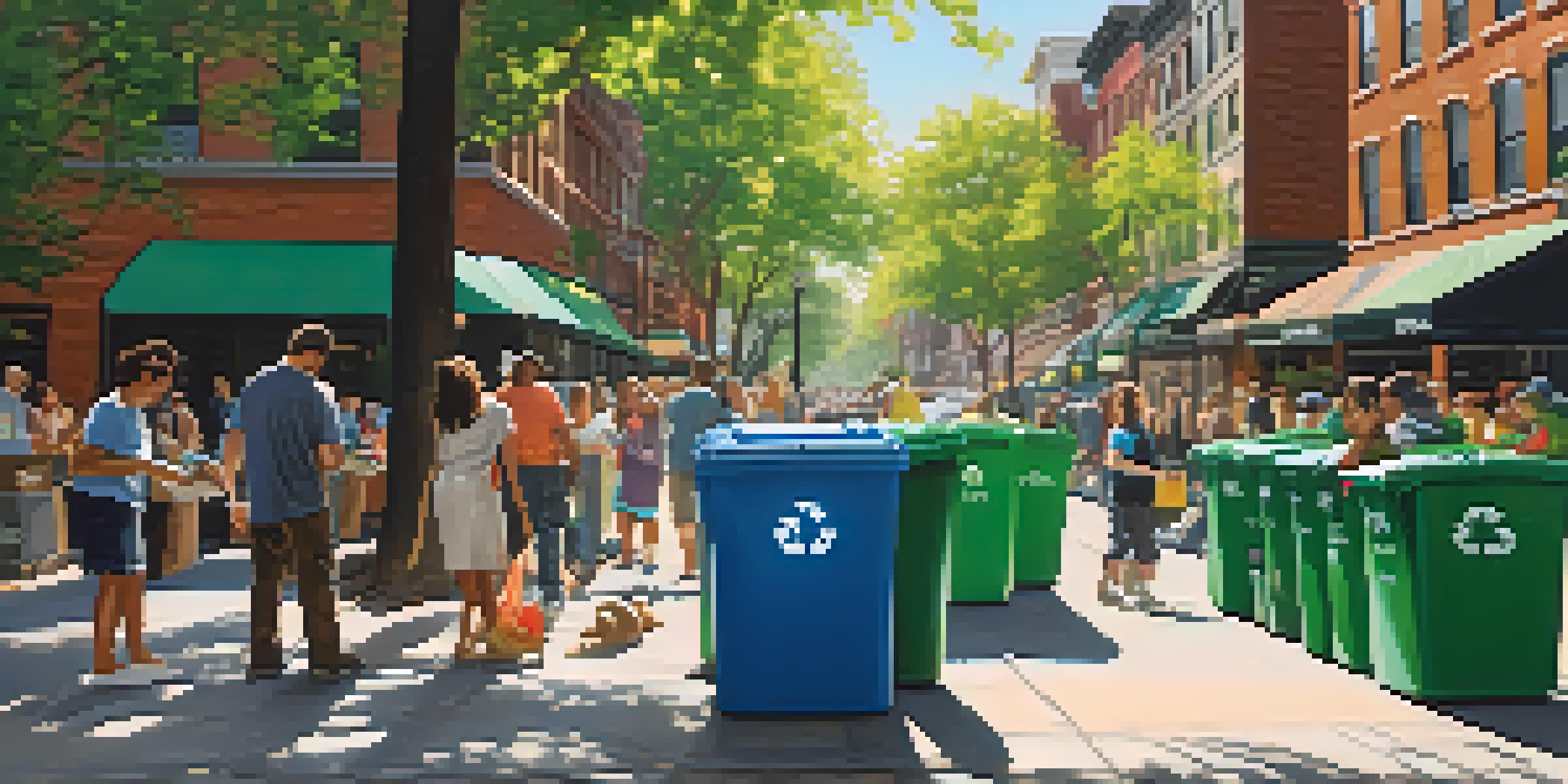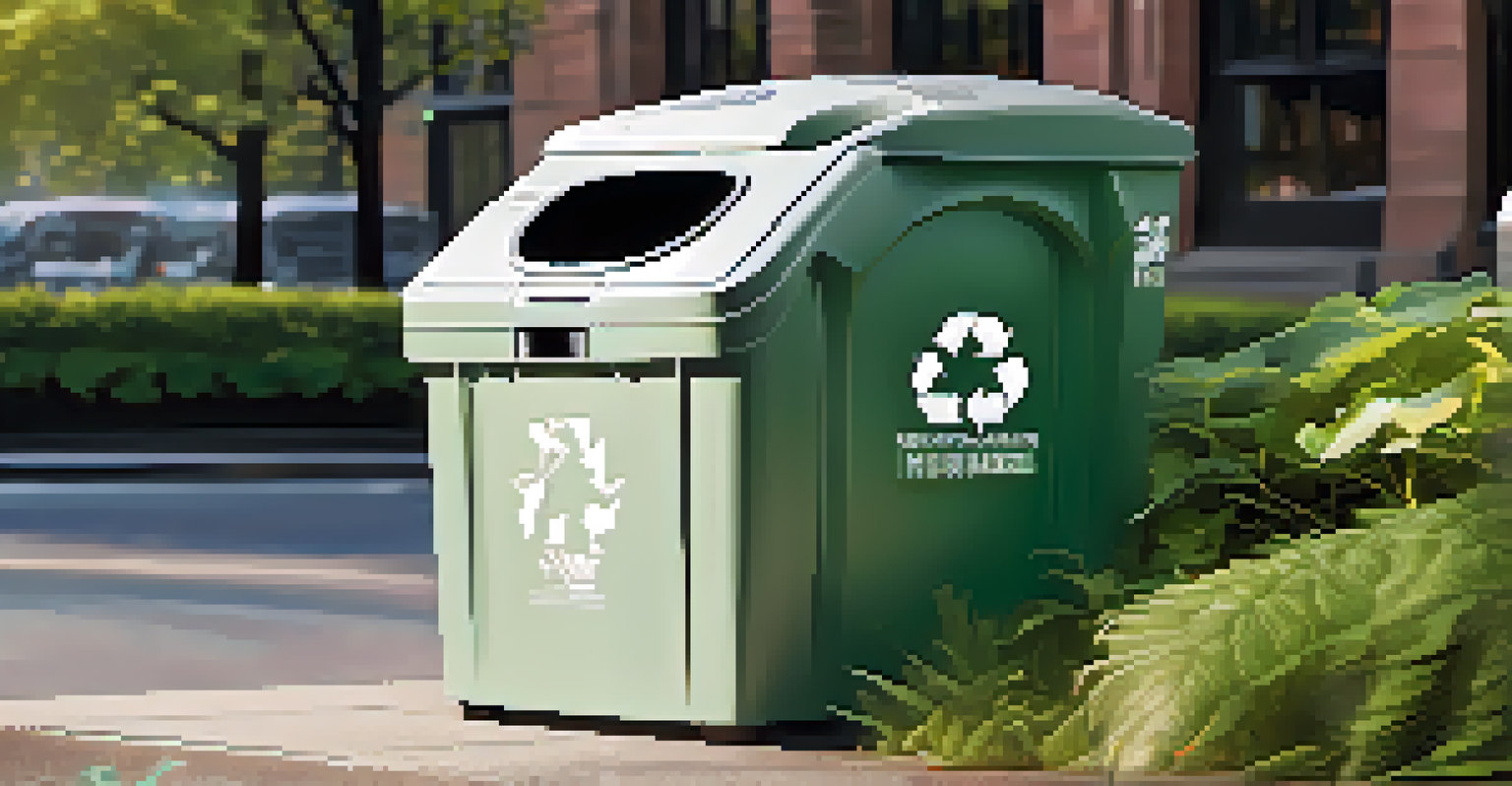Sustainable Waste Management: NYC's Recycling Programs

Understanding Sustainable Waste Management in NYC
Sustainable waste management refers to the practices that minimize waste and promote recycling and reuse. In a bustling city like New York, where millions generate tons of waste daily, implementing effective strategies is crucial. The goal is to reduce landfill use while protecting the environment and conserving resources.
The greatest threat to our planet is the belief that someone else will save it.
New York City's approach to sustainable waste management is multi-faceted, engaging residents, businesses, and government agencies. By focusing on recycling and composting, the city aims to divert a significant portion of waste from landfills. This initiative not only helps the environment but also fosters a culture of sustainability among New Yorkers.
Understanding the importance of sustainable waste management helps residents appreciate their role in the city's recycling efforts. Every small action, from sorting recyclables to reducing single-use plastics, contributes to a larger goal of creating a cleaner, greener urban environment.
The Basics of NYC's Recycling Program
NYC's recycling program is designed to make it easy for residents to participate. The program accepts a wide range of materials, including paper, cardboard, metals, and certain plastics. This comprehensive approach enables residents to recycle more items, thus reducing overall waste.

One of the program's key features is its user-friendly recycling bins, which are strategically placed throughout the city. These bins are clearly marked, making it simple for residents to know what can be recycled. The city's commitment to accessibility is crucial in encouraging participation in the recycling initiative.
NYC's Focus on Recycling and Composting
New York City emphasizes recycling and composting to reduce landfill waste and promote sustainability among residents.
Furthermore, New York City periodically updates its recycling guidelines to keep up with changes in waste management technology and practices. This ensures that residents are informed and can adapt their recycling habits to align with the city’s evolving goals.
Composting: A Key Component of NYC's Waste Strategy
Composting is an essential part of New York City's waste management strategy, aimed at reducing organic waste in landfills. By composting food scraps and yard waste, residents can significantly decrease the amount of waste they send to landfills. This process not only helps the environment but also produces nutrient-rich soil for urban gardening.
We do not inherit the Earth from our ancestors; we borrow it from our children.
The city offers various composting programs, including curbside collection and community composting sites. These initiatives provide residents with multiple options for participating in composting, helping to make it a viable choice for all New Yorkers. The goal is to educate and empower residents about the benefits of composting.
Moreover, composting contributes to a circular economy by returning nutrients to the soil, which is vital for urban agriculture. This not only supports local food systems but also fosters community connections through gardening projects that utilize compost.
Challenges Facing NYC's Recycling Efforts
Despite its commitment to sustainability, NYC faces several challenges in its recycling programs. One significant issue is contamination, which occurs when non-recyclable materials are mixed in with recyclables. This can lead to entire batches of recyclables being sent to landfills, undermining the city's recycling goals.
Another challenge is the sheer volume of waste generated by a densely populated city. With millions of residents and visitors, the amount of waste produced can be overwhelming. This demands constant innovation and adaptation in recycling strategies to effectively manage and reduce waste.
Community Engagement is Essential
Active community involvement is crucial for the success of NYC's recycling programs, helping to raise awareness and participation.
The city's recycling program also relies heavily on public participation. Ensuring that residents are informed and motivated to recycle correctly is crucial. Ongoing education and outreach efforts are necessary to address these challenges and encourage sustainable practices.
The Role of Community in Recycling Initiatives
Community involvement is vital for the success of NYC's recycling programs. Local organizations and residents play a crucial role in promoting recycling and composting initiatives. By fostering a sense of community ownership, the city can enhance participation and compliance with recycling guidelines.
Neighborhood events, workshops, and educational campaigns are instrumental in raising awareness about sustainable waste management. These initiatives help demystify recycling processes and encourage residents to adopt more sustainable practices in their daily lives. A well-informed community is more likely to engage in eco-friendly habits.
Additionally, community-led efforts can address specific local challenges, tailoring solutions that resonate with residents. This grassroots approach not only builds stronger neighborhoods but also contributes to the overall success of NYC's recycling initiatives.
Innovative Recycling Technologies in NYC
New York City is embracing innovative recycling technologies to enhance its waste management efforts. One such technology is advanced sorting systems that can identify and separate recyclables more efficiently. These systems help reduce contamination and improve the quality of recycled materials.
The city is also exploring partnerships with tech companies to develop apps that assist residents in recycling properly. These apps can provide information on what can be recycled and where to dispose of waste responsibly, making recycling more accessible and user-friendly.
Embracing Innovative Technologies
NYC is adopting advanced recycling technologies to improve waste management efficiency and encourage proper recycling practices.
By integrating technology into its recycling initiatives, NYC aims to create a more efficient waste management system. This not only streamlines the recycling process but also encourages residents to participate actively and stay informed about their recycling practices.
The Future of NYC's Recycling Programs
As New York City continues to evolve, so too will its recycling programs. The focus will likely shift towards more sustainable practices that incorporate the latest technologies and community feedback. This adaptability is crucial for meeting the challenges of a growing urban population and changing environmental conditions.
Future initiatives may include expanded education programs, more accessible recycling options, and enhanced partnerships with local businesses. By fostering collaboration, the city can create a more inclusive and effective recycling framework that benefits all residents.

Ultimately, the future of NYC's recycling programs hinges on the collective effort of the community, government, and technology. Together, they can pave the way for a more sustainable city that prioritizes waste reduction and environmental stewardship.